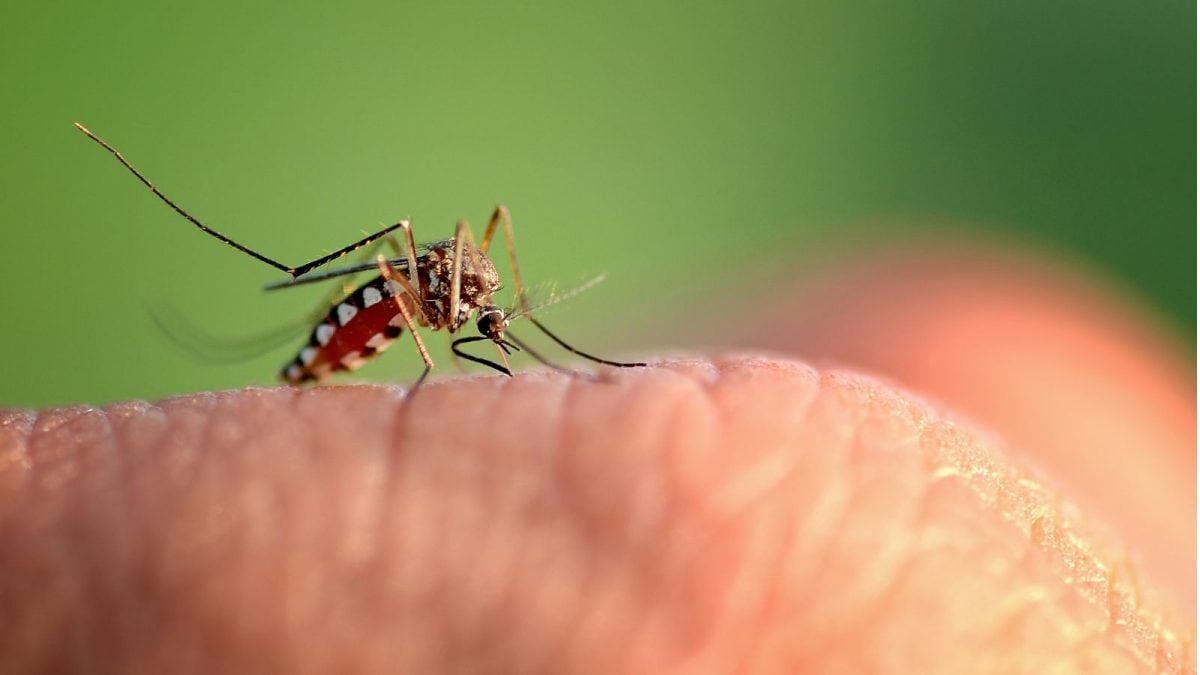Last Updated:
In the fight against dengue, accurate information is as important as medical care because prevention begins with knowledge.

Dengue fever is caused by the bite of mosquitoes carrying the dengue virus (DENV) and is transmitted primarily by Aedes aegypti and, to a lesser extent, Aedes albopictus mosquitoes
Hospitals have seen a rapid surge in dengue cases in recent times. With this rising trend comes a common question: Do dengue mosquitoes really bite only in the morning?
Dr Ajay Nair, Sr Consultant, Internal Medicine, Narayana Hospital, Jaipur shares all you need to know:
Understanding Dengue and Its Carrier
Dengue fever is caused by the bite of mosquitoes carrying the dengue virus (DENV) and is transmitted primarily by Aedes aegypti and, to a lesser extent, Aedes albopictus mosquitoes. These vectors are well-adapted to urban environments, thriving in stagnant water around homes, offices, and public spaces. Once infected, the mosquito can remain a carrier for its lifetime, transmitting the virus to humans every time it bites.
Unlike malaria, which is spread by Anopheles mosquitoes active at night, Aedes mosquitoes cannot be linked to a single time frame, as their biting patterns vary. This often causes confusion about the timing of their bites.
The Feeding Habits: Science Over Assumptions
The peak activity of the Aedes aegypti mosquito has been recorded in the early morning and late afternoon, as documented in multiple entomological studies, including those published by the World Health Organization (WHO) and the National Vector Borne Disease Control Programme of India. The highest activity typically occurs for about two hours after sunrise and several hours before sunset.
However, their bites do not occur only in the morning. While early daylight hours see the most concentrated activity, Aedes mosquitoes can bite throughout the day, particularly in shaded indoor areas with low light. Dengue cases typically rise during the monsoon, when breeding sites multiply and mosquito activity remains high almost throughout the day until evening. This flexibility increases the chances of virus transmission, especially in densely populated areas.
Clearing the Misconception
The belief that dengue mosquitoes bite only in the morning likely stems from early observations showing higher bite counts after sunrise. While this is statistically accurate as a trend, it is not the whole picture. People are still at risk during other active hours, particularly in the late afternoon and early evening.
Prevention: Beyond the Clock
Since the Aedes mosquito’s activity is not limited to one specific time of day, dengue prevention must be a continuous effort. Medical recommendations from Narayana Health Hospital include:
Controlling the surroundings
Make it a habit to empty stagnant water from containers such as flower pots, buckets, utensils in the sink, discarded tyres, and open storage tanks. Frequently change water in plant trays and bird baths, and always cover stored water. Remember, Aedes mosquitoes breed in clean water too.
Installing physical barriers
Use mesh screens for doors and windows, wear long-sleeved clothing, and keep doors closed during peak mosquito activity.
Using repellents
Apply mosquito repellent creams or sprays on exposed skin every few hours during daylight, not just in the morning. Alternatively, use mosquito nets.
Community action
Participate in neighbourhood clean-up drives to remove puddles and water collected in discarded items. Fumigation can also help reduce mosquito populations.
Prevention during travel
When visiting dengue-hit areas or places experiencing heavy rains, ensure you are protected from bites regardless of the time of day.
Why Awareness Matters
Millions worldwide suffer from the effects of dengue fever, with India bearing a significant share of the global burden. Misunderstanding mosquito behaviour can lead to carelessness, inadvertently increasing infection rates.
The idea that dengue mosquitoes bite exclusively in the morning oversimplifies their complex behaviour. While Aedes aegypti activity may peak just after sunrise and before sunset, bites can occur at other times too. Public health protection relies not on a specific “danger hour,” but on vigilance from dawn to dusk.
By consistently following preventive measures, individuals and communities can significantly reduce transmission. In the fight against dengue, accurate information is as important as medical care because prevention begins with knowledge.

Swati Chaturvedi, a seasoned media and journalism aficionado with over 10 years of expertise, is not just a storyteller; she’s a weaver of wit and wisdom in the digital landscape. As a key figure in News18 Engl…Read More
Swati Chaturvedi, a seasoned media and journalism aficionado with over 10 years of expertise, is not just a storyteller; she’s a weaver of wit and wisdom in the digital landscape. As a key figure in News18 Engl… Read More
view comments







